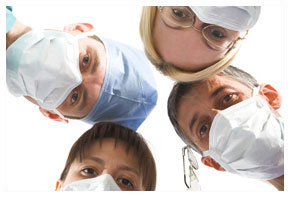Surgery Day Guide
|
Although this list was created with thehelp of my own plastic surgeon, this list is just an example. Please obey your own surgeon. You should do as he or she tells you in the list that he/she should provide you. If you didn't get a list, ask for one. Many tips are very important while others will simply make the ride home much more comfortable. Jolts and bumps from potholes can cause more discomfort than you'd think. Of course it depends upon how long your surgery was and if the injections of local anesthetic are wearing off, your own pain threshold and if you were given some of your pain medication for the ride home. All these factors can make a big difference in your level of comfort. |
|
Printer Friendly Version
RECOMMENDED!
-
ARRIVE ON TIME. You should have the arrival time in your information packet or at least confirm the night before and make the proper notation. If you are late, the surgeon may cancel your surgery and charge you for it anyway. Then the surgery fee is non-refundable.
-
ARRIVE CLEAN. This means freshly-scrubbed with your instructed soap, clean DRY hair - NO lotions, deodorant powders, perfumes, make-up, etc.
-
Wear your surgery "gear" - comfortable, easily-accessible, loose-fitting clothing with slippers.
-
DO NOT eat or drink anything after midnight on the evening prior to your surgery if you are having surgery in the morning.
-
DO NOT bring rings, watches, or other jewelry or large sums of money to the surgery center or hospital; leave these items at safely at home.
-
Most patients take one 1000mg Vitamin C capsule 2 times daily (2000mg total) or tablets for approximately 2 weeks prior to surgery. This is thought to promote good healing. You may continue this vitamin after surgery at the rate of one daily. Also, Discuss with your doctor the use of arnica montana or Bromelain, a pineapple extract, for added anti bruising and anti swelling properties. Always ask you surgeon for his specific instructions as he or she may not agree with any of this.
-
Take any medications you were instructed to take with only a few sips of water. Such medications may be Catapres (blood pressure), Anti-inflammatory, valium, antibiotics, blood thickeners, etc.
-
Prior to surgery, should you develop any fever, chills or other signs of a cold or other infection, call the office immediately.
-
Bring with you your surgery bras, or any instructed medications, garments or bandages.
-
Also bring pillows to plop around you for the ride home
-
Bring a bucket or can, with a lid and some cool, bottled water to sip and rid you of the unpleasant taste you may get if you vomit. Besides cool water really helps keep the nausea at bay.
-
Bring your sunglasses.
-
Perhaps bring a few packs of crackers to help with the nausea.
-
Bring some bottle water or soda water too, flat club soda is the best if it doesn't make you ill.


